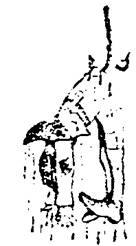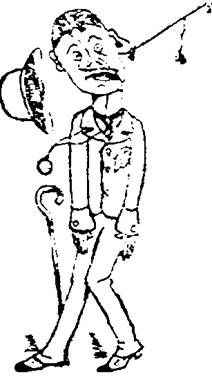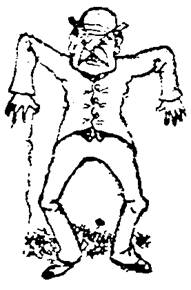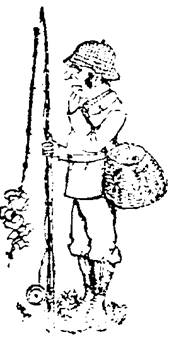This article has been transcribed from a copy of the Cardiff Times in the online collection of scanned Welsh newspapers 1804-1919 in the National Library of Wales, with grateful recognition of the free access accorded to all readers. Where necessary paragraph breaks have been introduced for easier reading. — David Skilton
This article belongs to the tradition of sporting mishaps, to which Pickwick Papers belonged until Charles Dickens took it over and turned it into an episodic novel. — David Skilton

Angling? Rather! I have been angling many a time — and I know it. The first time I fished was in a well-known river. I might as well have been fishing in air. I didn't get a bite; but a ferocious dog, that was the property of a farmer on whose land I had strayed, did. The dog took a fancy to the pattern of my trousers, and he took a pattern away. I wish he'd taken the sample from any other portion of my trousers than he did. Then I fished in a canal. I didn't catch anything, but a tow rope caught me. I was going to say that it ‘landed’ me about seven yards off, but it didn't — I wish I had been ‘landed.’ It threw me into the water, and the blatant and beastly boatman said the canal owners ought to prosecute me for going down to steal mud. I have had a good deal of trouble fishing, as you will see. I could stand it well enough if people wouldn't interfere with me. But when ‘clever-heads’ who go past will keep asking me what I have caught, whether I have caught aught but a cold, whether there are any cod fish in the stream, and whether I have ever used cobblers' wax for bait, I begin to be annoyed. The worst nuisance amongst them is the intrusive person who. with a diabolical grin, volunteers to go in and ‘hook 'em on.’ He is generally a sort of village idiot, and has a large following in the shape of little boys eating treacle and bread, and who laugh at everything he says. I generally manage to be even with him, sir. Once at a place where the stream was shallow I got him near the brink, and then I gave him a gentle push. Talk about hooking them on; he had to be hooked out. He was rescued from four feet of water with a double hook and gimp by a man who was fishing for pike. We succeeded in getting him to the bank with a landing net, and then we turned him upside down to let the water run out. I should think that since that date he has always ‘hooked’ it off instead of asking whether he might ‘hook 'em on’ when he has seen an angler.

I have had some splendid days' sport sometimes. It may seem incredible, but I have actually caught as many as four sticklebacks, one gudgeon, a newt, and a dead roach in one day. There are various styles of angling. I'm not a ‘fly’ fisherman myself. I have tried that form of fishing, but I generally found that the fish were more ‘fly’ than I was. I have chiefly tried bottom fishing, but I haven't quite got to the bottom of it yet. When I got thrown into the canal, as I have told you, I thought that was bottom fishing with a vengeance. Fly fishing it very easy to accomplish — if you only know how. Till you know how there are many difficulties in your path. Never begin to learn near a popular riverside promenade, or you’ll hook somebody's eye out probably, or find that you have caught a portion of the ear of a passer by. It is in vain to apologise under such circumstances. If you do not accomplish this feat you will probably fancy that you are cracking a whip and whisk your end fly off. You will hear a crack. When you do you may make up your mind that the end fly on your line has lit somewhere behind you two or three fields off. When you do get your line to the water, it is probable that it will fall in a tangled lump almost at your feet.

There is nothing sweeter and more soothing perhaps about fishing than being interviewed by a deputation of three cows in a lonely spot. They come up cautiously, and stare at you as though wondering what it was all about. Then one of them suddenly makes a dash for your fishing-basket, which contains your dinner, and sends the whole lot in the river. The only advice I can give you is that you should fold up your tackling and take your hook — hook and line, and rod as well, of course. It is highly probable that one of the cows go with you — very close behind you. Never mind your dinner — you'll get more of beef, in a lively state, than you want if you stop behind. A man who stops to play at ‘pitch and toss’ with cows always loses. The cow generally goes head and you go tail. Then gamekeepers may interview you; it is a way they have. If one asks you what you are doing there when you are fishing preserved waters, quietly — if he is less than you are, mind you — ask him in return whether he can swim. If he takes no notice of this, ‘square’ him. You can easily succeed in doing this, for all keepers of game are fond of fowl play of that sort. If you do, by accident, succeed in catching one or two good fish, it is always well, when you have done fishing for the day, to stuff your basket f[u]ll of stones and grass up to the very lid, and then put the two or three fish on the top. If anybody asks you what you have caught, say nothing, but simply and significantly lift the lid and disclose the scaly spoil. The gazer will at once conclude — that is unless he has been at the game himself — that you have caught a basket full.

A fisherman should never carry too large a creel with him, for one very small and consumptive looking fish looks very bad in a wilderness of basket. Should you catch a fish of a sort you can't exactly classify, say nothing about it, but magnanimously return it to the stream. It is well to be exceedingly careful with hooks. Don't leave them about before starting on your excursion — or after, either. A baby with seven sneck-bend hooks i[n] its interior is apt to be restive even under the influence of soothing syrup. Some men like wrapping their lines round their hats, but be careful of this practice when you are travelling by rail, or you will almost inevitably hook yourself to the carriage somehow. I know of nothing better calculated to shed a heavenly calm over the human spirit than a large hook in one's thumb. The dance one executes on the spot is not probably of such a kind as an experienced ballet master might approve, but it has a weird charm about it which would recommend it highly to an Indian of the Hokipoki, or some other tribe. I was talking about preserved waters just now — they are not preserved in the sense that ginger and fruits are, you know. Well, I generally find somehow that when I fish in them I go on the wrong day — according to the keeper, that is. He may well be called a keeper, for he keeps the fish, it's very certain. Some people like to ‘fight’ a fish, to tire it gradually out, you know. I don't. When I hook one I lift it straight out right away into the field at the back. If it makes too much bother there I murderously settle it with a stone. I never try to get the hook out of the jaws of a pike. I did once. It whispered its last dying speech and confession to two of my fingers with its teeth, and I have the marks yet. I once caught a young salmon. Yes, it was a smelt— and it smelt very badly. It was dead and floating on the top of the water. It had possibly been so young that it hadn't learnt to swim and had got out of its depth and been drowned.


I don't know how it is but I frequently have the misfortunes to get my line lost in a tree. Under these circumstances it is always best to try and extricate it gradually. Don't be rash and give a tug and imagine that you can pull the tree up by the roots. You won't succeed. On the contrary you'll find that your rod is a wreck, and your line a tangled mass of confusion. The only thing you can do is to go home. Never try wading, even in proper india-rubber stockings. If you chance to make a slip and get your stockings full of water, woe betide vou. It will take a whole team of horses to drag them off, and, as you walk home, you will hear the most charming music in your boots. But I still love angling. It brings you face to face with nature, you know. I don't know that there is any particular advantage in this myself — but poets say there is. I am going to try a new sort of bait — a piece of india-rubber saturated with scented hair oil. They say that it is very killing [attractive]. I don't know about the india-rubber, but I feel certain that scented hair oil will be killing enough. Well, ta, ta, I'm again on holiday (Bank Holiday) making.
Links to Related Material about Fishing
- Victorian Leisure Activities
- John Leech’s Cartoons on Fishing
- “A Fishing Song” by William Brighty Rands
- Seine Fishing by Henry Meynell Rheam, RI (1859-1920)
- Gudgeon Fishing on the Upper Thames by H. R. Robertson
Last modified 2 December 2021